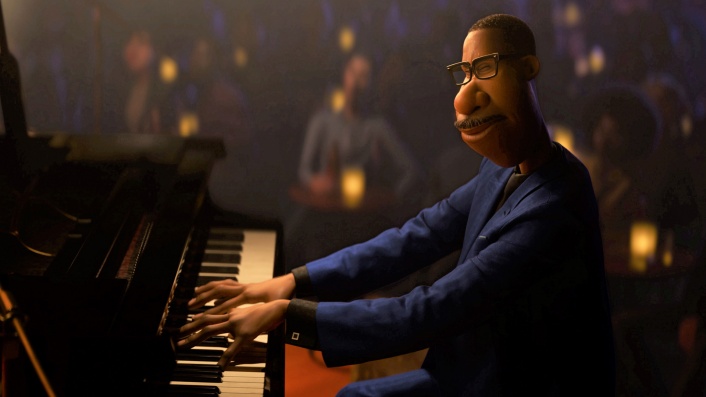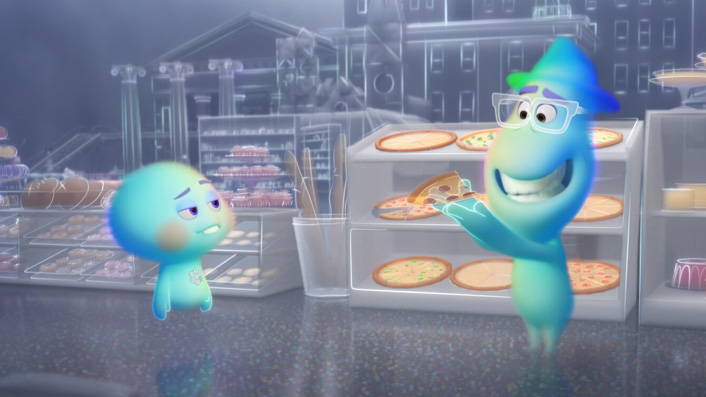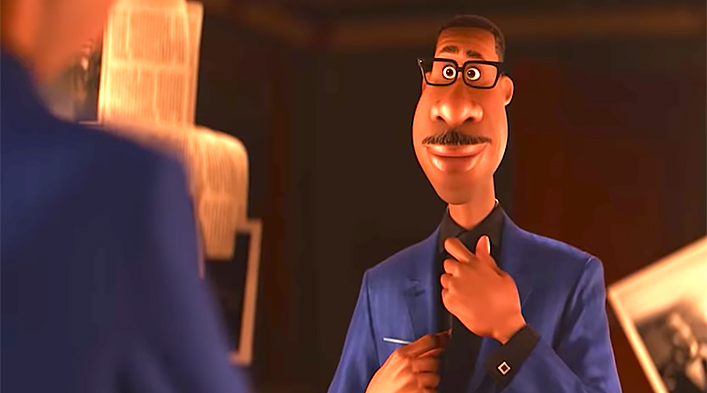Soul is a charmingly fun metaphysical movie with bright colours and big ideas

Landing on Disney+ on December 26, Soul is a spritzy Pixar animation about an aspiring jazz musician determined to pursue his dreams—undeterred by his own death. Here’s critic Luke Buckmaster’s review.
Films about following your dreams are a dime-a-dozen. Films about following your dreams then falling to your death then landing in a spirit world populated by cute blob-like blue things then teaming up with an unborn soul to return to the land of the living in the form of an emotional support cat—well, that is a somewhat less populated genre.
See also:
* All new movies & series on Disney+
* All new streaming movies & series
With just one title: Pixar’s charmingly fun and euphoric comedy adventure, Soul, which has a spritzy energy, a hard-to-hate wholesomeness and a cheerfully random and unpredictable structure—in that sense a bit like a top-tappin’ improv jazz solo. It is similar to Coco and Inside Out in that the film (co-directed by Pete Docter and Kemp Powers) is a sweet-natured, bright coloured metaphysical story that tosses around Big And Important philosophical subjects such as the self and the afterlife.
Soul begins with the part-time high school teacher Joe (voice Jamie Foxx) conducting a humorously bad class band, which soon turns into him singing behind the piano about the day he knew he was “born to play.” But…born to play, or born to teach? That snobbish old expression comes to mind—the one about how “those who can, do” and “those who can’t, teach.”
Joe is soon presented with good news—kinda—that the school would like to hire him full-time. “Kinda” because for him this is a double-edged sword: financial security at the cost of putting his dreams of being a professional jazz muso on the backburner. And then, a lucky break! He lands an audition to play with a visiting jazz legend, Dorothea Williams, who is a ball-breaking but brilliant diva—like Octavia Spencer’s ‘Mother of the Blues’ character in the recent period piece Ma Rainey’s Black Bottom.

During his audition something lovely happens: Joe gets lost in his performance and the room around him disappears, walls and furnishings replaced by sumptuous thick blue light with shimmering reds and pinks dancing through it—as if he is floating in his own dreams. Scenes like this, pairing psychology of character with form and presentation, demonstrate the swiftness with which animation can merge aesthetic and subtext; a freedom that comes from not being restricted by the camera’s mechanical addiction to recording reality.
After the audition, happy as a clam and whistling a merry tune, Joe takes a wrong step into the aforementioned pothole, resulting in an unlikely and untimely death. This scene reminded me of the excellent Netflix documentary Dick Johnson is Dead, in which the director comes to terms with the imminent death of her ailing father by illustrating various creative but plausible ways he could cark it.
Joe (now taking the form of one of those cute blue blobs) lands on a stretch of floating highway in The Great Beyond, triggering a part of the script that plays around with the idea of bureaucracy in the afterlife—putting it in the company of films as A Matter of Life and Death and, more recently, TV’s The Good Place, but without being wedded to Christian visions of heaven and hell. Joe’s subsequent adventures involve a raffish young spirit named 22 (voice of Tina Fey) and their partnership gives the story an odd couple / buddy comedy dynamic. I won’t go into the details of their adventures; the important thing to know is that Joe is desperate to return to his body for the gig at the jazz club.
For a while, directors Docter and Powers appear blindly devoted to the ‘never give up on your dreams’ mantra, with everything bending to accommodate Joe’s mission: even the infrastructure of the afterlife, which inadvertently permits him to chase his aspirations. But “you can’t eat dreams for breakfast,” says Joe’s mother, acting as the stern spokesperson for a creativity-stifling world that casts us all as players in a rat race. But suppose Joe does (no spoilers) play the piano for the jazz star. Would that really justify his existence? Would it make his life more valuable, more complete, more ‘whole’?

The idea that a person achieves a long-sought ambition then dies happily is, most of the time, fanciful to say the least; each of us strives to achieve our dreams but life rarely comes with clear-cut narrative structures—and has a way of not matching up expectations with reality. Ticking boxes on a bucket list does not necessarily bring us any closer to general fulfillment, despite what cheesy Hollywood comedies have to say, and potentially also distracts us from the unplannable aspects of happiness: the simple truth that often it either comes to you or it doesn’t.
It is a credit to the screenwriters (Docter, Powers and Mike Jones) that Soul ultimately—although it takes a while—builds a space more contemplative and interesting than just banging on about hopes and dreams. It’s fun and undemanding to watch, with an undeniable aura of cutsiness, but its messages and ideas that stay with you; you toss them around in your head afterwards. The ability for Pixar movies to contemplate big questions stopped being a surprise a long time ago, but is and will continue to be a pleasure—evoking the child in the adult and the adult in the child.

















